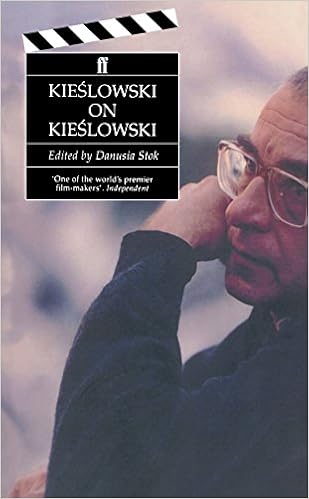
Free Kieslowski On Kieslowski Ebooks To Download

Krzystof Kieslowski untimely death in 1996 robbed cinema of one of its great visionaries. Decalogue, The Double Life of Veronique and the Three Colours trilogy earned Kieslowski his reputation as a world-class film-maker. He was notoriously reticent, and even dismissive of his work and talent, but these frank and detailed discussions showed a passion for film-making that animated a life disrupted by both Hilter and Stalin and the legacy these figures left in Eastern Europe. His struggle to work as a film-maker mirrors the struggle of Poland to reassert its identity. In 1989, when the Berlin Wall collapsed and Eastern European states overthrew the oppressive Soviet burden, his orientation gravitated towards France. Moving between Poland and France, Kieslowski created some of the most important cinematic works of the Nineties.

Paperback: 224 pages
Publisher: Faber & Faber (April 13, 1995)
Language: English
ISBN-10: 0571173284
ISBN-13: 978-0571173280
Product Dimensions: 5.2 x 0.7 x 8.5 inches
Shipping Weight: 14.1 ounces (View shipping rates and policies)
Average Customer Review: 5.0 out of 5 stars See all reviews (9 customer reviews)
Best Sellers Rank: #380,327 in Books (See Top 100 in Books) #215 in Books > Biographies & Memoirs > Arts & Literature > Movie Directors #461 in Books > Humor & Entertainment > Movies > Video > Direction & Production #568 in Books > Humor & Entertainment > Movies > Direction & Production

This is a well-organized and informative book. While it is based on a series of interviews, the Q&A format is not used; instead, Stok lets Kieslowski narrate in his own words various stages in his life and films he has made. The effect is that of eavesdropping on a chance monologue, or that of a very colloquial autobiography. Although Stok (I think) happens to be the wife of one of Kieslowski's main cameramen, personal sentiments do not get in the way at any point. This book also contains, in addition to the compulsory stills from his documentaries and movies, various other interesting material such as photographs that Kieslowski himself took as a student at Lodz Film School.The portrait of Kieslowski that emerges is of an overwhelmingly modest, considerate, private, and above all *humane* human being, self-deprecating to the extreme even after his international success as a director. He dismisses his vocation as the worst job in the world, hilarious (issuing directions via microphone and speaker, freezing, to a half-clad Grazyna Szapolowska atop a makeshift tower at 2am) and insignificant(his frustrating administrative experiences as a member of the Polish filmmaking guild). However, you realize that the poignant messages that come through in his films are the result of a unique personal/private sensitivity; he tries to articulate the manner in which outside events touch the individual, and hopes to touch the individual in the audience through his work. You can't reproach him for insisting that "you will never know what is deep inside me, no one will ever know, the experience is mine alone.
In his own words, Krzysztof Kieslowski tells you about the agony and the ecstacy of the independent filmmaking process.The late Polish filmmaker is up to the challenge, delivering his characteristic frankness nestled within the pages of this short retrospective work, narrated in his own words, and magnificently edited (translated, too?) by Danusia Stok.The book is tailor-made for "idie" filmmaking buffs, and supplies a glimpse into the enticingly magical personality which was Kieslowski's. Eschewing a typical rote autobiographical style, Kieslowski divulges key details about himself via the device of his extensive filmography -- revealing things about his thinking process and the high value he places upon delicate human emotionality through a step-by-step examination of his long filmography.Spanning his early years as a prominent documentary filmmaker during the stifling years of Polish Communism and state censorship -- especially during the imposition of Marshal Law in Poland during 1980-1 when Kieslowski couldn't work for half a year -- and ending with his magnificent trilogy "Barwy" (Three Colours: Blue, White, Red), we're subjected to a feast of Kieslowski-isms regarding his thoughts pertaining to such diverse notions as:** casting for acting talent.** Kieslowski's penchant for making his ENTIRE crew a part of the idea-generating process for his films.** the nature of artistic filmmaking in Europe compared to commerical filmmaking in the US.** the demands of time on a filmmaker's personal life.** the differing range of skills between Western and Polish filmmaking crews.
Kieslowski on Kieslowski



